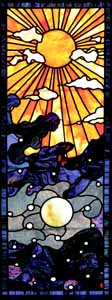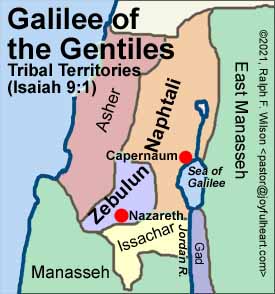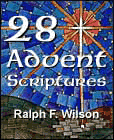
|
Old Testament
New Testament
Gospels
Acts
Paul's Letters
General Letters
Revelation
Topical Studies
Beginning the Journey (for new Christians). en Español

|
Old Testament
New Testament
Gospels
Acts
Paul's Letters
General Letters
Revelation
Topical Studies

|
Home
Bible Studies
Articles
Books
Podcasts
Search
Menu
Donate
About Us
Contact Us
FAQ
Sitemap
Day 5. A Great Light Has Dawned (Isaiah 9:1-2)
Thursday, First Week of Advent
 'Creation: Day 4,' stained glass window, Muhlenberg Lutheran Church, Harrisonburg, Virginia, artist: Mary Delany. |
For the next three days we'll focus on one of the most beautiful and famous prophecies of the Messiah, written by the prophet Isaiah perhaps 700 years before Christ's birth. God shows him glimpses of the glory of the coming Messiah. Today we'll consider the first two verses.
"1 Nevertheless,
there will be no more gloom for those who were in distress. In the past he
humbled the land of Zebulun and the land of Naphtali, but in the
future he will honor Galilee of the Gentiles, by the way of the sea,
along the Jordan--
2 The people walking in
darkness have seen a great light;
on those living in the land of the shadow of death
a light has dawned." (Isaiah 9:1-2, NIV)
Zebulun and Naphtali
During the Conquest, Joshua allocated territories west of the Sea of Galilee for the tribes of Zebulun and Naphtali to settle. When the kingdom divided, these territories became part of the northern kingdom of Israel. Though these were the first areas to be overrun and humbled by the Assyrians in 733 BC (2 Kings 16:29), and by later powers -- thus called, "Galilee of the Gentiles" -- they include the site where the town of Nazareth would be built where Jesus is raised, as well as the area of Galilee where much of Jesus' ministry is conducted.
 Notice the tribal lands of Zebulun and Naphtali to the west of the Sea of Galilee, the area around Nazareth and Jesus' Galilean ministry. Larger map. |
Matthew tells us that this prophecy is fulfilled in Jesus:
"When Jesus heard that John had been put in prison, he returned to Galilee. Leaving Nazareth, he went and lived in Capernaum, which was by the lake in the area of Zebulun and Naphtali -- to fulfill what was said through the prophet Isaiah." (Matthew 4:12-14)
Great Light
Contrast the words in verses 1 and 2 that contrast Galilee's previous state to its wonderful renewal in the day of the Messiah.23
|
Previous Sadness |
Messiah's Blessing |
|
Gloom |
|
|
Distress |
|
|
Humbled |
Honor, make glorious |
|
Darkness |
Great light |
|
Shadow
of death, |
Light has dawned |
The fulfillment, of course, is found in Jesus.
Matthew's Gospel tells us that Joseph, after being directed in a dream to return from the Holy Family's sojourn in Egypt, receives another dream, steering him away from Bethlehem, now ruled by Archelaus, who was even more brutal than his father Herod.
"... Having been warned in a dream,
he withdrew to the district of Galilee,
and he went and lived in a town called Nazareth." (Matthew 2:22)
Instead of being known as Jesus of Bethlehem, City of David, with all the Messianic importance implied by that, he is known simply as Jesus of Nazareth, a small, unimportant town not even mentioned in the Old Testament.
Nazareth was apparently a town with no distinction at all. Nathanael asks disdainfully, "Can anything good come out of Nazareth?" (John 1:46). As Isaiah had said, "He was despised and rejected by men" (Isaiah 53:3). He comes from a backwater town, a place of no distinction, a region with an inglorious history, a region considered by Jerusalem's elite as having little to offer.24
And so Jesus is known as a Nazarene, a carpenter's son. After his baptism in the Jordan and 40 days of temptation in the Judean wilderness, he returns to Galilee and begins to declare beside that lake the glorious news of the Kingdom of God. Matthew tells us,
"13 Leaving Nazareth he went and lived in Capernaum by the sea, in the territory of Zebulun and Naphtali, 14 so that what was spoken by the prophet Isaiah might be fulfilled: 15 'The land of Zebulun and the land of Naphtali, the way of the sea, beyond the Jordan, Galilee of the Gentiles --16 the people dwelling in darkness have seen a great light, and for those dwelling in the region and shadow of death, on them a light has dawned.' 17 From that time Jesus began to preach, saying, 'Repent, for the kingdom of heaven is at hand.'" (Matthew 4:13-17)
It is in Galilee that people begin to see the Kingdom of God breaking into our world. This light comes in the form of wonderful teachings, astounding miracles, compassionate healings, and authoritative commands that drive demonic influence from hapless victims.
Jesus the Light of the World (John 8:12; 9:5) begins to shine in Galilee. And it is in Galilee that the battle with Satan is joined, for the enemy could not let this light shine or he will be doomed. Paul tells us:
"The god of this age has blinded the minds of
unbelievers,
so that they cannot see the light of the gospel of the glory of Christ,
who is the image of God." (2 Corinthians 4:4)
But Jesus' light is irrepressible!
"In him was life,
and the life was the light of men.
The light shines in the darkness,
and the darkness has not overcome it." (John 1:4-5, ESV)
(See the meditation for Christmas Day.)
 Also available in book formats: PDF, Kindle, and paperback. |
It began in Galilee with Jesus and since then the world has not been the same.
"The people walking in darkness have seen a
great light;
on those living in the land of the shadow of death a light has dawned."
(Isaiah 9:1-2)
And though sometimes dimmed and distorted by evil men, this light has continued to shine through the ages as men and women, boys and girls encounter Jesus personally and come to know him. Inner darkness is driven out by his light and replaced day by day, more and more, with his truth and love, his light and joy. Hallelujah!
Prayer
Father, fill our lives with Jesus' light. Sometimes we've lived in darkness while knowing better. Forgive us, we pray. Though we may seem insignificant to the world, you have chosen us as those in whom your light will shine. Shine on! In Jesus' name, we pray. Amen.
Discussion Question
Q5. (Isaiah 9:1-2) Why do people choose to live in
darkness when light is available? (John 3:19). Why do people seem to resist the
Light of Jesus? Why do you sometimes hesitate to step into Jesus' full light?
How did Light transform the reputation of Galilee? How has light transformed
your reputation in your circle of friends?
https://www.joyfulheart.com/forums/topic/2079-q5-galilee/
Endnotes
[23] Verse 1: "Gloom" (NIV, ESV, NRSV), "dimness" (KJV) is mûʿāp, "gloom," from ūp, "to be dark" (TWOT #1583). "Distress" (NIV), "anguish" (ESV, NRSV), "vexation" (KJV) is mûṣāq, "constraint, distress," from ṣûq, "constrain, press, bring into straits," (TWOT #1895a), the idea of the walls pressing in. "Humbled" (NIV), "brought into contempt" (ESV, NRSV), "lightly afflicted" (KJV) is the Hiphil perfect stem of qālal, "be slight, trifling, of little account." The basic meaning of the root sets forth the quality of "slightness" as to provision. So this root is used of intending a lowered position, technically, to curse (Leonard J. Coppes, TWOT #2028). "Honor" (NIV), "make glorious" (ESV, NRSV), "more grievously afflict" (KJV) is the Hiphil perfect of kābēd, "be rich, honorable, glorious." The basic meaning is "to be heavy, weighty"; the concept of a "weighty" person in society, is someone who is honorable, impressive, worthy of respect (John N. Oswalt, TWOT #943). Verse 2: "Darkness" is ḥōshek, "darkness" (TWOT #769a). "Great light" is gādôl, "great" and ʾôr, "light," from ʾôr, "to be or become light, shine" (TWOT #52a). "Shadow of death" (NIV, KJV), "deep darkness" (ESV, NRSV) is ṣalmāwet, "deep darkness," from ṣālal, "to be or grow dark." Some treat it as a combination of ṣalāmu "be dark" (Akkadian, also Arabic) plus ût as an abstract ending. Most versions understand it as combination of "shadow" and "death" (John E. Hartley, TWOT #1921b). "Darkness" (Holladay, p. 306). "Light" is ʾôr, "light" (TWOT #52a). "Dawned" (NIV), "shined/shone" (ESV, NRSV, KJV) is nāgah, "shine" (TWOT #1290) followed by the preposition 'al, "upon, over, above."
[24] This seems to be the meaning of Matthew's statement (1:23) that the prophets said that Jesus would be a Nazarene (so Morris, Matthew, pp. 48-49; France, Matthew, pp. 90-95). Attempts to connect Matthew's statement to either the idea of a Nazarite or to several Messianic prophecies of "the Branch" (Hebrew nēṣer, Isaiah 11:1b; cf. Zechariah 3:8; 6:12) are unconvincing.
Copyright © 2025, Ralph F. Wilson. <pastor![]() joyfulheart.com> All rights reserved. A single copy of this article is free. Do not put this on a website. See legal, copyright, and reprint information.
joyfulheart.com> All rights reserved. A single copy of this article is free. Do not put this on a website. See legal, copyright, and reprint information.

